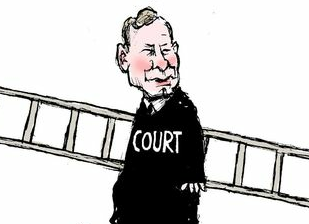
Sorting through the responses to yesterday’s SCOTUS decision raised a number of questions, starting with whether I should wait for the slowpokes, which I decided against because the weekend approaches and not only would they be that much slower, but my readership declines on Saturdays and Sundays and I wanted to strike while the iron was hot.
From there it came down to choosing among specifics and the answer was to choose the least specific, which was Walt Handelsman’s overall comment about the impact of the current court.
He covers the totality of recent decisions, as did President Biden in his off-the-cuff remark that “This is not a normal court.”
Biden later elaborated in an interview with MSNBC’s Nicolle Wallace that the current court “has done more to unravel basic rights and basic decisions than any Court in recent history.”
He’s not alone in that observation. Others have pointed the same thing out, that we have, over the past century, seen court decisions provide more freedoms rather than restrict them. Until now.
It’s also a common observation that the only amendment that took away a freedom was Prohibition, which we then rescinded.
However — and it’s a major however — I appreciate that Handelsman put donkeys, not average Americans — under that hammer, as he tied both affirmative action and freedom of choice together in the package of lost rights.
This approach to government was, in the latter half of the 20th Century, relatively universal. The people who opposed abortion were sidelined as particularly strict religious folks unlikely to yield to democratic ideals on that topic, while those who opposed civil rights were castigated as bigots.
Well, the 20th Century is over now, and Handelsman is correct not to pretend that personal rights and freedoms are still a non-partisan matter.
They shouldn’t be a partyline matter. But somehow they have become one.

Clay Jones is harsh to single out Clarence Thomas as an ungrateful opponent of a movement under which he benefited, but Thomas has served up a slow, underhand pitch begging to be smashed over the outfield walls.
It’s painful to think that he doesn’t see racial preference in his being plucked from Southern poverty and sent to a New England prep school, and it’s equally painful to hear that he felt it unfair that affirmative action got him into Yale, but not so unfair that he transferred to Savannah State or (assuming he could get in) Morehouse.
And it is farcical to believe race did not figure in his appointment to the Supreme Court, unless you believe it was because he was chosen as the one judge most likely to continue Thorgood Marshall’s pursuit of civil rights and equality and was only coincidentally African-American.
Thomas may have been ashamed to be an affirmative action admission to college, but he got over being ashamed when it came to sexual harassment of an employee and when it came to accepting lavish gifts and money from a rightwing activist.
So, obviously, he has grown in confidence since his college days!
Time, he says, for other minorities to grow up, too, not through their own experience but through their observation and rapturous contemplation of his, Lalo Alcaraz suggests.
Or perhaps through the content of their character, the color of their skin being irrelevant, as is so often said by the nice folks who couldn’t pick Martin Luther King out of a lineup but wouldn’t be surprised to see him there.
Anyone who thinks racial equality is a done deal should explain it to young black drivers.
Or tell it to Ralph Yarl, the 16-year-old who knocked on the wrong door when he went to pick up his little brother from a playdate.

Thomas is a particularly blind hypocrite, but he’s not the only arrogant, isolated, privileged person on the Supreme Court or in their fanbase, and Pat Byrnes also uses the familiar ladder image to demonstrate the willful blindness of those who knock it away.
Having the white boy in the midst of a golf game is an excellent touch to move this beyond pure race and into the realm of active privilege.
Byrnes and I are both Notre Dame graduates, but I wouldn’t be, if we were the same age, because he got there after the place went co-ed, but I was wait-listed back in the days when it was male-only.
Once they began admitting women, the applicant pool swelled, and when I see our fellow alum, Mallory McMorrow, I can’t help but thank god she wasn’t around when I applied!
Not that it would have taken someone like her to knock my application into the waste basket, which is more the point.
Simply adding to the pool would have done it.

As Matt Davies points out, there are more reasons for unfair decisions than affirmative action, unless you consider it affirmative action to admit underqualified students so their alumni parents will keep giving to the annual fund.
I couldn’t understand why everyone was talking about legacies yesterday until I went back and read up on the decision and saw that both sides had brought it up in arguments, Harvard having an astonishing number of legacies amongst its student body.
And, in fact, one of Harvard’s lawyers said if they quit giving preferences to legacies, they would wind up with even fewer minority students. I mean “in fact” he said it. Not that “in fact” it would happen.
To be fair, he was counting scholarship athletes, not just legacies, and Harvard says it is “home to 42 nation-leading Division I intercollegiate sports teams,” none of which you’ve ever heard of except when guys in tweed jackets go watch a football game and write about it for the New Yorker.
However, it does raise the numbers, whether or not it changes the overall atmosphere of the place.
I might be a little embarrassed to bring it up as a mitigating factor.
Ain’t you got no physisists?

Mike Luckovich explains that SCOTUS seemingly has more faith in minorities than it does in legacies, though, to be fair, I’m not sure they could have returned a decision that left affirmative action in place while banning legacies.
Not saying it wouldn’t have been fair, just that I think someone would have had to have sued over legacies and donor-preference in order to have it happen.
I wish someone would. I’d love to see the discovery documents and find out how a certain ex-president got into UPenn.
Not to mention how another ex-president got into Skull and Bones, much less Yale itsownself.
One of my pals freshman year was a legacy. We both got wretched grades that put us below the bar for room selection as sophomores. I was forced to move off campus but he somehow scored a spacious single in a terrific dorm.
The impact of this preferential treatment has plagued me for six decades and muchly ruined my life and stunted my career.
Any lawyers out there want to take the case?
No Ivy League nepo-babies, please.



When I was a freshman at SUNY, they brought in a couple dozen affirmative action students from NYC. They spent their time playing drums on the steps of the dorm. In about a week they were gone. Those students got a ladder with only one rung.
Either times change or it was a different grouping. In the 90s, I had a GF who taught a SUNY Plattsburgh summer course for kids who needed an academic booster before beginning freshman year. Many were foreign, some were just from not-so-great rural schools. Bright kids who hadn’t been properly prepared for the next step.
But, strictly speaking, “affirmative action” is a tie-breaker within the pool of qualified applicants, not a chance for unqualified kids. There are other programs for students with limited qualifications.
I went to Yale (undergrad) at the same time as Clarence Thomas. He’s right about the stigmatizing effect of Yale’s admission preferences at that time. The college basically had a clumsy quota system, and admitted some conspicuously unqualified students out of desperation to reach their target. And most of them washed out, painfully. But people (like employers) still gave special scrutiny to all the black students. (The same was true for legacy admissions, but it was more openly admitted.)
As for legacy admissions, if Felicity Huffman wants to pay $2million extra to get her daughter into a more into a more prestigious school, let her. Just be honest about it and make the school put a big chunk of the money into financial aid. The world would be better off if Yale and Harvard just auctioned off 100 places in each class (with some minimum standards) and made sure every other student got enough financial aid without crippling loans. Legacy admissions are a fundraising gimmick that has nothing to do with fairness.
Legacy admissions are a fundraising gimmick that HAVE nothing….so much for education. Can’t even get past basic grammar.
I’m waiting for Ginny to discover that Clarence is working to repeal “Loving vs. Virginia.”
To add to the supreme court’s brazen shamelessness, the ruling on the web designer vs gay weddings was based on a complete fabrication:
https://www.cnn.com/2023/06/30/politics/colorado-web-designer-court-filings/index.html?fbclid=IwAR3w5V-2SGB_8InIghbuJzpxGcsmu1dyzVwh7nQyaX0FXiTSc55pjpeZOZU